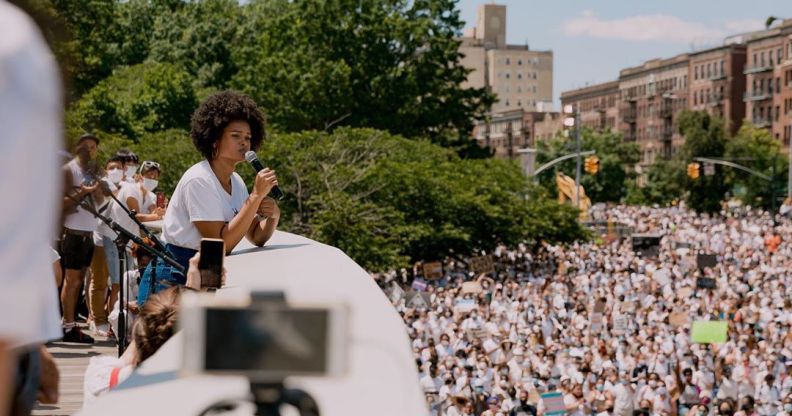Activist Raquel Willis pays tribute to Black trans elders Marsha P Johnson, Miss Major and Zazu Nova

Raquel Willis addresses 15,000 people at June’s Black Trans Lives Matter rally in New York. (Instagram/Raquel_Willis)
Raquel Willis – who led a chant for 15,000 people at June’s Black Trans Lives Matter rally in New York – has paid tribute to Black trans elders Marsha P Johnson, Miss Major and Zazu Nova.
Standing on the steps of the Brooklyn Museum in June, the 29-year-old ended her speech by leading thousands of people in a history-making pro-trans chant.
“I believe in my power,” she said, as people in the crowd echoed the words back.
“I believe in your power. I believe in our power. I believe in Black trans power.”
Now, Raquel Willis – an activist, media strategist and former Transgender Law Center national organiser, who is currently writing her debut book – has spoken about her commitment to empowering Black trans voices and the rich history of their community.
In an interview with Vogue, Willis said that her speech at the Black Trans Lives Matter rally was “energising and cathartic”.
“I appreciated that so many allies came together to support the Black trans community, whether it was through planning or participation,” she said. “It’s a moment that I will never forget.”
But while she said she grew up with “a bevy of Black historical figures to look up to”, Willis admitted that it wasn’t until she was an adult that she began learning about Black queer and trans history – even though “Black trans people have been fighting for our lives for generations”.
“In the US, we have historical figures from the 1800s such as Mary Jones and Frances Thompson, who would have been considered trans by today’s definitions,” Raquel Willis said.
“And of course, we had folks including Marsha P Johnson, Zazu Nova and Miss Major [Griffin-Gracy] fighting during the Stonewall riots.
“Miss Major is still on the frontlines at protests for George Floyd, and there are so many other Black trans elders across the US who paved the way for the kind of organising we do today.”
Finding out more about “ancestors and elders with stories” will help more people to understand the “liberation that we’re seeking”, Willis continued.
“Breaking down restrictive gender norms [has] an ancient, sacred history,” she said. “It will ultimately liberate everyone.”

